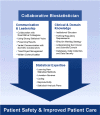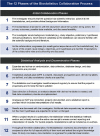Methods for training collaborative biostatisticians
- PMID: 33948249
- PMCID: PMC8057395
- DOI: 10.1017/cts.2020.518
Methods for training collaborative biostatisticians
Abstract
The emphasis on team science in clinical and translational research increases the importance of collaborative biostatisticians (CBs) in healthcare. Adequate training and development of CBs ensure appropriate conduct of robust and meaningful research and, therefore, should be considered as a high-priority focus for biostatistics groups. Comprehensive training enhances clinical and translational research by facilitating more productive and efficient collaborations. While many graduate programs in Biostatistics and Epidemiology include training in research collaboration, it is often limited in scope and duration. Therefore, additional training is often required once a CB is hired into a full-time position. This article presents a comprehensive CB training strategy that can be adapted to any collaborative biostatistics group. This strategy follows a roadmap of the biostatistics collaboration process, which is also presented. A TIE approach (Teach the necessary skills, monitor the Implementation of these skills, and Evaluate the proficiency of these skills) was developed to support the adoption of key principles. The training strategy also incorporates a "train the trainer" approach to enable CBs who have successfully completed training to train new staff or faculty.
Keywords: Collaborative biostatistician; collaboration and communication; professional development; quantitative collaboration; training strategy.
© The Association for Clinical and Translational Science 2020.
Conflict of interest statement
SCG reports receiving consulting fees from Gilead Sciences for serving on multiple Data Monitoring Committees. SMT reports receiving consulting fees from Abbvie, Inc. for work on biosimilars and bioequivalence. Although these relationships are not perceived to represent a conflict with the present work, they have been included in the spirit of full disclosure. There are no other conflicts of interest to report.
Figures
References
-
- Rubio DM, del Junco DJ, Bhore R, et al.. Biostatistics, Epidemiology, and Research Design (BERD) Key Function Committee of the Clinical and Translational Science Awards (CTSA) Consortium. Evaluation metrics for biostatistical and epidemiological collaborations. Statistics in Medicine 2011; 30(23): 2767–2777. - PMC - PubMed
Grants and funding
LinkOut - more resources
Full Text Sources
Miscellaneous


